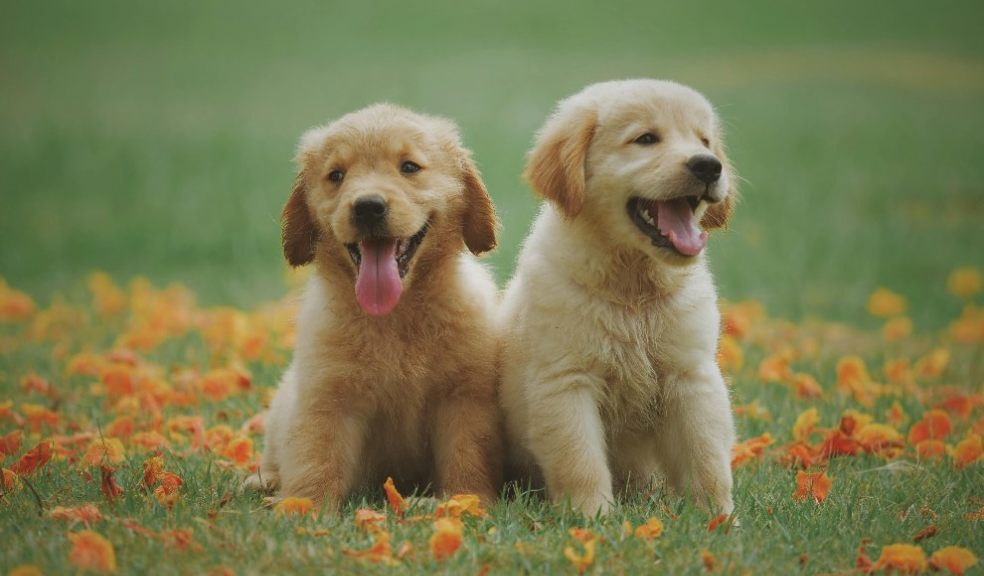
Absolute Dogs’ Tips to Raise a Happy, Healthy Puppy During Adolescence
Puppies are only puppies for so long. Once they turn six months old, they start their journey towards adolescence. At this age, your puppy will begin to leave old habits — like biting — behind. As their hormones, brain, and body mature, you’ll likely find new training challenges to overcome.
Here, Lauren Langman and the training pros at Absolute Dogs share:
- What to expect during your puppy’s adolescence.
- How to strengthen your relationship with your puppy during their adolescence.
- How to support your puppy through adolescence-related challenges.
Topping Up Your Puppy’s Relationship Bank Account
Absolute Dogs encourages owners to imagine they have opened a relationship bank account to support their puppy. Owners can make contributions to this bank account during their dog’s puppyhood, adolescence, and adult years.
As an owner, you can make deposits in your puppy’s relationship bank account by creating positive interactions. Playing games is a great way to create such interactions. Games take the pressure out of training for both you and your puppy, as they teach concepts rather than behaviour.
During your puppy’s adolescence, expanding their behaviour repertoire might not be the most appropriate training focus. While they’re undergoing such a high level of change, the number of behaviours they master doesn’t matter. Instead, employ games that help you top up your puppy’s relationship bank account while upholding clear expectations and boundaries.
It’s always a good idea to make deposits in your puppy’s relationship bank account. On the flip side, be careful not to make “withdrawals,” such as punishments or negative feedback.
When your puppy behaves undesirably, it’s easy to want to curb this behaviour. However, corrections and “fixing” behaviours can create pushback for your puppy. This kind of pressure can escalate their undesirable behaviour and even damage your relationship with them.
Instead, positive reinforcement helps grow your relationship with your puppy and keep them wanting to enjoy adventures with you.
Common Adolescent Puppy Training Challenges
It can be overwhelming when your puppy — who was progressing well with disengaging from the world — seems to take three steps back as they approach adolescence. The good news is that, if you’re experiencing this challenge, you’re not alone.
In this case, Absolute Dogs recommends playing relationship-centred games that focus on disengagement. These games provide a fun alternative to training that avoids pointing out your puppy’s mistakes. This way, you can prepare your puppy for the blips that will naturally occur throughout their adolescence.
These blips typically occur when a puppy develops a fear, frustration, or excitement response. This response may be barking, lunging, or growling, amongst other behaviours. Puppies usually exhibit responses like these when they find it difficult to regulate.
- Lose interest in you/activities quickly.
- Become overstimulated quickly, whether excited or anxious.
- Test boundaries more, leading to recall challenges.
- Become more or less sociable around other dogs and people.
- Start following scents.
- Sleep less than before and have more energy to burn.
- Exhibit more risk-taking behaviour.
Sometimes, the stimulus behind your puppy’s fear, frustration, or excitement response will never have proven problematic before. Alternatively, the stimulus may have come up earlier in your puppy’s life but now triggers more of a reaction.
Reducing Your Puppy’s Rehearsal of Teenage Behaviours
Adolescent puppies often feel less attached to their owners than they did when they were young puppies. As this National Library of Medicine study highlights, this detachment often manifests similarly to a human teenager seeking independence away from their parents.
This reduced attachment might mean that your puppy’s responses to stimuli lessen. If your puppy’s responses dwindle, remember that they’re not being disobedient. This is a natural change as their body and brain evolve.
If your puppy seems to detach from you, re-introduce the management training strategies you used during their early life. This approach can help reduce your puppy’s rehearsal of teenage behaviours, which might include:
- Counter surfing.
- Barking at dogs or people on walks.
- Pulling on the lead more than usual.
- Not listening to your cues.
These wilder-than-usual behaviours are often reminiscent of a teenager’s emotion-fuelled or frustrated actions when they don’t feel in control. When a teenager is in this situation, support without any pressure is usually helpful. Your puppy needs similar support during their adolescence.
Setting up an environment where your puppy can’t rehearse teenage behaviours can lay the foundation for you to offer this support. Try exercise pens, crates, and gates to adjust their environment.
Concept-Focused Dog Training for Adolescent Puppies
Absolute Dogs recommends three concepts to focus on when training your adolescent puppy:
1. Optimism
Giving your puppy easy wins can bring a wave of optimism to your training. This is crucial when your puppy is struggling with a challenge that they were coping well with just a few weeks ago. Optimism can encourage stronger disengagement and strengthen your relationship with your puppy during what can be a turbulent time.
2. Non-Event Training
Non-event training is more important than ever during your puppy’s adolescence. This training involves going into any situation with the expectation that whatever happens is a) no problem and b) none of your puppy’s business. You can help your puppy realise this by rewarding them for not reacting whenever a potential distraction occurs.
If your puppy struggles with non-event training, increase the distance between them and distractions where possible. You can also opt for an easier environment next time you’re out and about. Remember to frame any struggles as an opportunity to try a fun game and help your puppy grow.
3. Reward Experiences
Given that adolescence is an essential time for relationship-building, incorporating rewards into your training is essential. Get creative and come up with a range of rewards that your puppy will find fun and engaging.
This is a time when your puppy is likely to get distracted easily and become more interested in the wider world. Offering a unique reward experience, perhaps through food and toy games, can help you stand out against what the world has to offer.
Taking The Pressure Off You and Your Puppy
Just as you shouldn’t put pressure on your puppy, you shouldn’t put pressure on yourself, either. Have fun and remember that it’s normal for puppies to backtrack during their adolescence. You may find that you can take a huge step forward simply by stepping back.
For more advice on supporting your puppy through their adolescence, download Absolute Dogs’ puppy resource bundle.
About Absolute Dogs
More than 120,000 owners have turned to Absolute Dogs for guidance with their dog training ambitions. In particular, the Games Club and Pro Dog Trainer Club nurture a supportive environment where dog handlers connect and inspire one another to reach their training goals.
Of Absolute Dogs’ many online resources and courses, the Sexier Than a Squirrel Challenge and Absolute Adolescence course can be especially helpful for owners who are guiding puppies through their teenage years.













